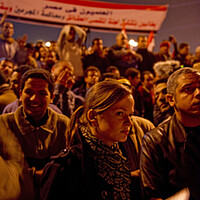In Gaza, a patriarch speaks of 'senseless' deaths of 8 family members
Loading...
| Ezbet Beit Hanoun, Gaza
Just last night, five members of the Abu Jarad family gathered with three of their young children at home. They had finished breaking the Ramadan fast, and in the sated contentment that followed, everyone tuned into Bab Al Harra, a popular TV series originally filmed in Syria.
But just after the start of the show, which comes on at 9 p.m., the family gathering turned to tragedy. An apparent artillery round plunged through the wall and exploded in the bedroom, turning furniture into rubble, tangling clothes across the floor, and throwing a woman's rhinestone-studded shoe atop bits of debris. A light fixture was torn from the ceiling, curtains hung in shreds, and a child's pink backpack lay amid the debris.
A stench now hangs over the room. A gaping hole in the wall reveals the cement-block houses of Beit Hanoun, and beyond, the border with Israel.
In one moment, eight members of the Abu Jarad family lost their lives, becoming some of the more than 330 who have died so far in the conflict between Israel and Gaza. Abdel Rahman and his wife, Rajia, died with their son Moussa, 6, and daughter Haniya, 2. Abdel Rahman's brother Naim died along with his one-year-old son Sameeh. Abdel Rahman and Naim's two sisters, Ahlam and Samar, were also killed.
Israel says it is striking Hamas targets, and that the militant Islamist organization uses human shields. But as the conflict nears the two-week mark, the civilian toll – including children – is steadily mounting. For this family, the tragedy was eight-fold.
The family's building is near Beit Hanoun, a town on Gaza's northeastern border where Israel recently launched a ground operation. Many people have left the area, which Israel has heavily shelled along with other parts of Gaza. Driving north from Gaza City, the streets become quieter and quieter, until in Ezbet Beit Hanoun they are deserted but for a pregnant donkey wandering along amid missile strike craters and scarred buildings.
The day after the eight relatives died, family patriarch Moussa Abu Jarad is still in the same clothes he wore at the moment of the strike. His green pants and white shirt are bloodied from carrying his children and grandchildren from the site of their death. He stares ahead, struggling to process thoughts in the wake of his tragedy.
To explain why he hasn't yet changed his clothes, he answers simply, “I haven't yet comprehended what happened.”
He says there is no reason to strike his family home – he is a businessman, he explains slowly. The large truck parked outside the family building testifies to his profession as a factory owner. The old Mercedes shows that he has made a good living.
“We have no relation to Hamas or Fatah,” he says. “We're businessmen and we don't care about politics. ... We didn't fire one bullet.”
Asked to describe his children, he lifted up his hands. “They are dead,” he said simply. His son – Abdel Rahman, killed with his wife and two of his children – left behind two more children, orphaned at the ages of 7 and 9.
Then his thoughts turn to his wife, and tears began to fill the deep lines of his face. He hadn't told her the truth last night. They rushed the bodies of his family members away, and he spared the difficult details from her.
He gave her the news at nine this morning, just one hour before they were buried. She had a nervous breakdown, he says.
Abu Jarad has a large family. With four of his children gone, 12 still remain – a number he struggles to remember in his state of shock. Grandchildren play in the courtyard of the family building. When the sound of a jet rips through the sky, one of them runs quickly inside, having learned what sounds to fear.
But the numbers remaining do not diminish his tragedy. Asked his age, he pauses. “From the nakba to the nakba,” he responds, using the word Palestinians use to refer to the loss of land and homes when Israel was formed in 1948, the year he was born. His life, he means, began with one tragedy and has stretched to include another.
As the sound of a drone buzzes above and the boom of an airstrike echoes nearby, he implies that his family died senseless deaths in what he considers a senseless conflict.
“If I were ruling, we would have reconciled [with Israel] long ago,” he says. “Israel cannot kill all the Palestinians and Palestinians cannot kill all the Israelis. So we have to have dialogue and make peace.”







